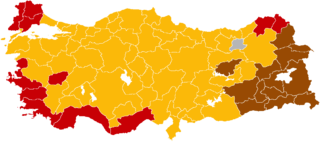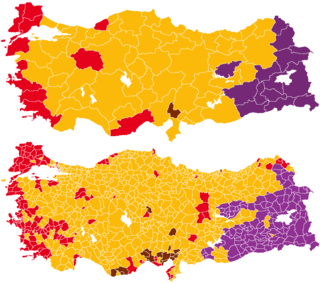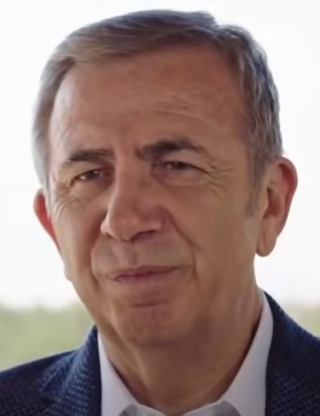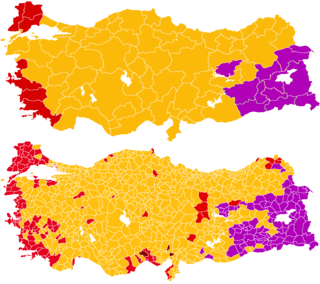
General elections were held in Turkey on 3 November 2002 following the collapse of the Democratic Left Party–Nationalist Movement Party–Motherland Party coalition led by Bülent Ecevit. All 550 members of the Grand National Assembly were up for election.

Kemal Kılıçdaroğlu is a Turkish economist, retired civil servant and social democratic politician. He is the leader of the Republican People's Party (CHP) and has been Leader of the Main Opposition in Turkey since 2010. He served as a member of parliament for Istanbul's second electoral district from 2002 to 2015 and as an MP for İzmir's second electoral district as of 7 June 2015.

The Turkish local elections of 2004 were held throughout the eighty-one Provinces of Turkey on 28 March 2004 in order to elect both mayors and councillors to local government positions. All 16 metropolitan and 3,193 district municipalities were up for election, while 3,208 provincial and 34,477 municipal councillors were also elected. More than 50,000 neighbourhood presidents (muhtars) were also elected, though these do not have any political affiliations.

General elections were held in Turkey on 12 June 2011 to elect the 550 members of Grand National Assembly. In accordance to the result of the constitutional referendum held in 2007, the elections were held four years after the previous elections in 2007 instead of five.

General elections were held in Turkey on 7 June 2015 to elect 550 members to the Grand National Assembly. This was the 24th general election in the history of the Turkish Republic, electing the country's 25th Parliament. The result was the first hung parliament since the 1999 general elections. Unsuccessful attempts to form a coalition government resulted in a snap general election being called for November 2015.

Local elections were held in Turkey on 30 March 2014, with some repeated on 1 June 2014. Metropolitan and district mayors as well as their municipal council members in cities, and muhtars and "elderly councils" in rural areas were elected. In light of the controversy around the elections, it was viewed as a referendum on the government of Prime Minister Recep Tayyip Erdoğan. About 50 million people were eligible to vote.

Mansur Yavaş is a Turkish lawyer and politician who is currently the Mayor of Ankara, holding the office since April 2019. He was elected in the 2019 local election as the candidate of the Nation Alliance, an opposition alliance formed by the Republican People's Party (CHP) and the Good Party.

Muharrem İnce is a Turkish physics teacher, school principal, sport executive, and politician. He founded and is leader of the Homeland Party since May 2021. Formerly a four term Republican People's Party MP for Yalova, his hometown, he also served as the CHP's parliamentary group deputy chairman between June 2010 and August 2014.

The 2003 by-election in the Province of Siirt was held on 9 March 2003 in order to elect three Members of Parliament from the eastern Turkish province of Siirt to the Grand National Assembly of Turkey. The by-election was held four months after the 2002 general election in November, which the Supreme Electoral Council of Turkey declared null and void in Siirt due to voting irregularities in the district of Pervari. The council decided on 2 December 2002 that the complaints by the local electoral authorities had influenced on the election result, thus calling a by-election.
Vefa Salman is a Turkish politician who is the incumbent Mayor of Yalova since 1 June 2014. Originally elected in the local elections held on 30 March 2014, the results in Yalova were invalidated by the Supreme Electoral Council of Turkey and the vote was re-held on 1 June, confirming his victory. He is a member of the Republican People's Party (CHP).
The electoral system of Turkey varies for general, presidential and local elections that take place in Turkey every five years. Turkey has been a multi-party democracy since 1950, with the first democratic election held on 14 May 1950 leading to the end of the single-party rule established in 1923. The current electoral system for electing Members of Parliament to the Grand National Assembly has a 7% election threshold.

General elections were held in Turkey on 1 November 2015 to elect 550 members to the Grand National Assembly. They were the 25th general elections in the History of the Republic of Turkey and elected the country's 26th Parliament. The election resulted in the Justice and Development Party (AKP) regaining a parliamentary majority following a 'shock' victory, having lost it five months earlier in the June 2015 general elections.

Mayoral elections were held in the Turkish province of Ankara as part of nationwide local elections on 30 March 2014. A total of 26 mayors, one for each of the 25 districts of Ankara and one for the Ankara Metropolitan Municipality, were elected.

The Turkish local elections of 2019 were held on Sunday 31 March 2019 throughout the 81 provinces of Turkey. A total of 30 metropolitan and 1,351 district municipal mayors, alongside 1,251 provincial and 20,500 municipal councillors were elected, in addition to numerous local non-partisan positions such as neighbourhood wardens (muhtars) and elderly people's councils.

Presidential elections were held in Turkey on 24 June 2018 as part of the 2018 general election, alongside parliamentary elections on the same day. They were the first presidential elections held after constitutional amendments were approved in a 2017 referendum.

The March 2019 Istanbul mayoral election took place on 31 March 2019, as part of the 2019 Turkish local elections. In addition to a mayor for the Istanbul Metropolitan Municipality, all 39 Istanbul districts elected their own individual mayors as well as district councillors.

Mayoral elections were held in the Turkish province of Ankara as part of nationwide local elections on 31 March 2019. A total of 26 mayors, one for each of the 25 districts of Ankara and one for the Ankara Metropolitan Municipality, were elected.

Ekrem İmamoğlu is a Turkish businessman, real estate developer, and social democratic politician serving as the 32nd Mayor of Istanbul. He was first elected with 4.1 million votes and won with a margin of 13 thousand votes against his AKP opponent in the March 2019 mayoral election as the joint Nation Alliance candidate of the Republican People's Party (CHP) and the Good Party, but served only from 17 April 2019 until 6 May 2019, when the election was annulled. He was then reelected in a renewed election on 23 June 2019 by an even larger margin of 800,000 votes. He had previously been the Mayor of Beylikdüzü, a western district of Istanbul, between 2014 and 2019.

The June 2019 Istanbul mayoral election was held on 23 June 2019. It was a repeat of the March 2019 mayoral election, which was annulled by the Supreme Electoral Council (YSK) on 6 May 2019. The original election had resulted in a narrow 0.2% margin of victory for opposition candidate Ekrem İmamoğlu, causing the governing Justice and Development Party (AKP) to successfully petition for a by-election.

The premiership of Recep Tayyip Erdoğan began on March 14, 2003, when the first Cabinet headed by Erdoğan was sworn in by the Turkish Parliament.















